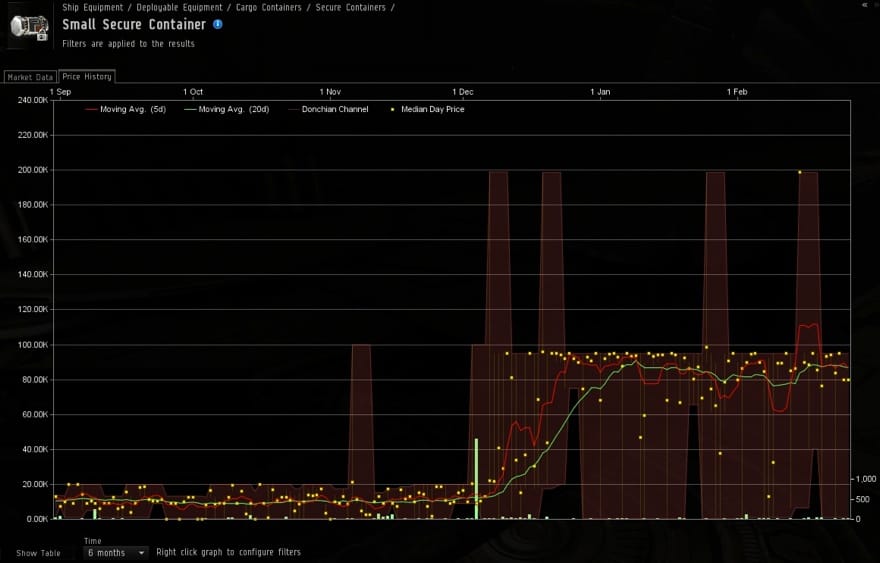Inside the cut-throat economy of Eve Online

This article is a collaboration with iQ by Intel.
Like Buddhist philosophy, Eve Online may best be explained in the form of a question: What would happen if the biggest trolls on the Internet were given command over a highly realized economy, plus spaceships? After 11 years of Godzilla-sized space fleet battles, the history of the perennial MMO is one of incredibly detailed enterprises being constantly thwarted by skullduggery, grudges, and betrayals on an almost Roman scale. The only thing more sophisticated than the game’s financial operations—which include shell corporations, holding corporations, and good-ol’ Mafia-style rackets—are the lengths that old rivals will go to foil them.
People often call games “story generators,” but with its enormous scale and persistent online universe, Eve’s stories feel more like legends. The most notorious heist is probably the tale of a machiavellian individual who had a blood feud with the CEO of UQS corporation, a large organization of players with some clout within the game. To get his revenge, he hired a mercenary corps called the Guiding Hand Social Club. The Guiding Hand’s plan was to commit large-scale corporate theft by placing eight secret agents in UQS, spending 11 months inconspicuously climbing the corporate ladder into positions with access to the money.
Economists spent the aughts looking for clues to real-world markets in the game.
Then, at the snap of a shadow figure’s fingers, they cleaned out the vaults, swiping around 30 billion in ships and ISK, the game’s virtual currency, which had taken thousands of people playing the game countless hours to gain. (For many players, involvement in a massively multiplayer online game can be like a second job.) In the process the Guiding Hand carried out a hit on the CEO, taking the corpse with them. Afterward they would boast she had fallen in love with one of their agents. It’s just that kind of a game.
It’s also the kind of game where you forget you’re talking about a game. The level of detail to the fantasy is remarkably convincing, perhaps nowhere more clearly than in the in-game economy. There are reasons economists spent the aughts looking for clues to real-world markets in the game’s virtual commodities, which trade in biofuel, silicon, and heavy metals, among other things. Groups of players are called guilds and clans in other games, but in Eve they’re called corporations because they are quite literally corporations: groups of people acting as a single entity to grow in influence and make money. The big ones have a CEO and a CFO, typically paying a dividend to players who have a stake in them.

“Invest wisely in the market and you could be looking to make 10 to 15 percent profit in a year,” says Paul Elsy, who previously ran a pirate corporation in Eve before going to work for the game’s creators, CCP. “There are a lot of IPOs ran legitimately by players in the game. There’s plenty to invest in. A lot of people log-in and never leave the station. They look at the margins. Sometimes they make a loss, sometimes they make a profit. They effectively act as brokers,” he tells me.
But investment in Eve can be far more of a gamble than selling short on the New York stock exchange. The markets are unregulated and the world is self-policed, recalling “the old mobster days when they’d drive one of their associates into a back alley and give them a good beating because he stepped out of line,” Elsy explains. This freewheeling, laissez-faire-to-the-extreme approach to banking is permissible because Eve’s financials are all fantasy. In-game capital cannot be converted into real-world dollars in any way, which is probably for the best, legally speaking.
It’s hard to know who you can trust in Eve.
In other words, the door is wide open for Ponzi schemes, and it’s hard to know who you can trust in Eve. A few years ago the space opera’s counterpart to Bernie Madoff made off with almost a trillion credits, enough to cripple the entire economy of the game. He and a few friends had founded a bank called Phaser Inc. They took deposits and held savings accounts, offering an appealing 5 percent interest rate. “After two and a half years,” Elsy says, “the CEO said, ‘Screw it, the wallets are looking a bit fat,’ and decided he wanted out.” One day he just vanished with the cash. There was an outcry among players, calling for CCP to break their hands-off policy to governing the world and intervene. But, Elsy says, CCP turned a blind eye. All’s fair in love and space war, apparently.




Comments ()